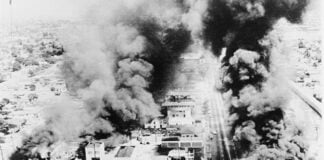Review: On Rage
By Germaine Greer, Melbourne University Press, $19.95
RIGHT-WING SUPPORTERS of the NT intervention will find comfort in the pages of Germaine Greer’s recent short essay On Rage, despite the symbolic and predictable thrashing the one-time left-icon received from the likes of Andrew Bolt, Miranda Devine and Marcia Langton in the ensuing media frenzy.
In On Rage Greer examines the historical legacy of colonisation on Aboriginal communities and attempts to explain the underlying reasons for the “persistence” of socially and self-destructive behaviour by Aboriginal males. On Rage details Aboriginal women’s experience of frontier sexual violence and concludes that Aboriginal social relations have been irreparably damaged by the process of Aboriginal men’s “emasculation”.
At the time of the former Howard government’s intervention announcement, Greer loudly declared her opposition, placing the blame for social dysfunction, such as substance and domestic abuse, firmly with the decades of racist government neglect and ongoing policies of cultural assimilation and dispossession.
In Britain’s Guardian newspaper in July 2007, Greer attacked the new laws as hypocritical and racist: “Meanwhile, Wadeye has grown to be the sixth biggest town in the Northern Territory, yet it has only 154 houses, 33 of which are derelict and should be demolished.
”In the others, occupancy stands at between five and six people per bedroom, a common state of affairs in the homelands. Dislocation, dispersion, rounding up and regimentation were followed, as usual, by neglect.”
But her new essay undermines these earlier blunt criticisms of Howard’s policy. She positions herself alongside right-wing intervention apologists in labelling all Aboriginal men as dysfunctional and abusive. In On Rage, there is little reference to the social impacts of overcrowding, impoverishment and systemic neglect that coloured her former analysis. Instead she declares there may be no answer to the problems in Aboriginal communities.
Greer’s confused attempt to explain the “widespread high levels of violent behaviour” exhibited by Aboriginal men leads her to place the blame on Aboriginal women, evidenced, supposedly, by their role as “emasculator” under colonisation and now as “supporters” of the intervention.
Greer asserts that Howard was responding “to the call of the (indigenous) women to come to the aid of them and their children. Once more the white man was being chosen over the dysfunctional black man as the protector of children,” she writes. “The defeat of the black man was absolute.”
In truth, the intervention was met with immediate resistance, condemnation and yes, even rage, by many Aboriginal women. Former ATSIC Chair Pat Turner described the bill as “the most racist and discriminatory legislation that this country has ever seen”. Aboriginal women tore up and burnt the 500 pages of legislation at an Alice Springs rally in 2007, promising to fight the government every step of the way.
Greer’s essay provides an account of the impacts of dispossession, including a seldom-heard emphasis on frontier sexual and labour exploitation of Aboriginal women. But On Rage should present a much clearer call for an end to the intervention, a policy so obviously intended to dispossess it deserves to be rejected wholesale by anyone purporting to defend Aboriginal rights.
By Lauren Mellor





